

 |
 |
|
|
|
#1
|
||||
|
||||
|
Mohoender 08-24-2008, 03:06 AM As Hangfire7 said, talking about politics is fun but it's time to get back to game.
Twilight occasionally talk about the steam subject and I know that some of you already talked about it. But as I did some careful work on that matter I give you an insight of what I got. I'll be glad if any of you has some more ideas about it. Anyway, in my twilight world, steam locomotives and armored trains are sometimes almost a common sight (depending on where you go). Starting with steam power ship. They are very few to be running nowadays but there are some interstings ideas I think. The Japanese could have refit the "Mikasa", their old 1905 battleship. I don't really know how much work the japanese will need to do that but I find it amusing to have Russian shipping and fishing being disrupted by the command ship that helped sunk their best fleet in 1905. Marseille will detain the last running steam yacht (I only recently discovered that; it is now in the hand of a Belgian women living in Monaco and if you want to buy it they are willing to sell for 100 million $). Both Civgov and Milgov would be very interested at putting an hand on it. Do you find that surprising that both governments be willing to launch an operation for a simple steam yacht? The answer is simple, they might want it in order to help unifying US again, this yacht is the one used at Yalta. You know? the one where that the picture with Roosevelt (the right one this time), Churchill and Stalin was taken. US also might still have some river steam boat (I don't know about the ones on the Mississippi but one is on display at the Champlain museum, VT). Russia is in that case too and I wouldn't be surprised to find some on the Danube river (including river gunboats). Concerning the steam locomotives, there are some good solutions too. Wales will certainly have some running (there is a very active association in the north of Wales I think). The Swiss would get some from tourist locations. France will do the same but they will be very little as we don't have that many steam locomotive in shape (moreover, France will have reopened coal mines in the North, in Belgium and in the Dead Zone). Sweden would get them from Finland mostly and they might even be building them again (assuming Antenna's point on that country). Russia would have several running in Siberia as I'm convinced Moscow would send railway troops to have them running. Moreover, almost every town on the transsiberian has one such locomotive on display. However, England, Germany, Poland and most other countries would have a railroad network that wouldn't work anymore. Anyway, I can easily imagine most countries with working railroad taking these things out of museums. A coal burning steam engine almost never dies on you except if it explodes of course. As they are made with simple alloy they won't need that much infrastrutures to repair. About the armored trains they are some options too. Sweden can get some from Finland (that country keeps various armored cars at different locations). Poland might too if it had railroad for it. Russia made some of the most powerful and efficient ones in history and they keep a number of these. They would represent a fantastic opponent in a Twilight world and that would not be so much difficult to adapt modern weaponry on them. With no air power to seriously threaten them, armored trains might become a very efficient tool again. As an exemple, one such russian train stopped an entire panzerdivision during 24 hours in WWII. It even survived and retreated back to its base. An other point about them is that they run on very few personnels and pack up a tremendous amount of firepower. Finally, they are easily made from scratch, built by adding whatever armor you find (look at yours from the civil war). Of course, the scratch ones are not as efficient as the one designed for the job but still they represent a problem. Until very recently, armies everywhere use to adapt tank turrets on armored trains (the French did in Vietnam). You can also put any type of car (armored car as well as jeeps) on rail with little handwork and, then, you control a large portion of rail with little spending. I hope that you find my little thinking to be interesting. PS: I had this idea because Twilight was quick to put several Russian units on horseback again. About that, this is not that easy as you need 2 horses for one man if you want such unit type to remain battleworthy. But still it works and cavalry units were known to run over 60 miles in a day. Russia even used them with success against the panzerdivisions. A horse is never stuck in the ice, a tank or a truck will be. Moreover, NATO soldiers will certainly have to fight the "Tatchanka" as the white russians and the poles did in the 1920's. Tatchankas are machine guns (often several) mounted on four wheel horse carriage and I'm convinced that the Russians would use such tools again. ******************** Hangfire7 08-24-2008, 03:33 AM I like your thinking! I actualy have used such units with deadly effect on my PCs. One group was a mounted column of Polish Regulars, when they encountered my PCs a few shots were exchanged the horse mounted troops responded with AK fire and one RPK giving a couple sets of volleys from the lead elements the rest darting for cover. <another item when dealing with larger groups, they tend to seek cover rather than fire back> And that was when the group suffered its first KIA. Another group the PCs encountered I think foot mobile troops, but they had horse drawn 120mm mortars and heavy machineguns. In another campaign the party encountered a group of Cossacks after escaping from a Prison train that was taking them east. The PCs escaped and were on the run. They then attempted to sneak into a camp of cossack type characters but were discovered and what a fight that was. It had everything, machineguns, explosions, hand to hand and a knife fight as well as a wagon of ammo blowing up so the knife fight had the effect of flames and shadows as ambiance. As for trains. I mentioned something akin to that on a post in either this group or the yahoo group some time ago. An example Perris Ca, they have a train museum with at least have a dozen steam locomotives that are actively running, a roundhouse, support cars for laying track and an assortment of other cars. They also have half a dozen locomotives that run but are not run regularly and another half dozen that are in the process of repair. Further, that is just 1 museum. There are half a dozen other museums in the area having between 1 and 12 steam locomotives within 50 miles of where I sit now. If they were used it would be able to maintain some form of transport and I think adaquate for a Twilight World. I think a weekly run from San Bernardino Ca, which is the largest rail center West of the Mississippi. Using that as the center, having a run to Stockton/San Fransisco and back, A circle route to Los Angeles then San Diego and the towns in between and returning to the center. A run to Las Vegas or the Boulder Damn or somewhere in that vicinity so they maintain contact east. Think about what that would mean? A weekly train, thus allowing for the transit of supplies, mail and communication with the outside world, and even passenger service on a limited scale. Mo, you mentioned T-34s and trains. I might be mistaken but I may have seen pictures or read about T-34s running on rails. How would that work as a means of keeping a rail line open, a tank rolling on the rails. Or, simply adding a coupler to the back of the tank just like a rail car so that it can be attatched to a train as the lead vehicle, or the tail vehicle giving the train some good firepower. Heck, you wouldn't even need a working tank, simply the hulk of one without the engine or radio system, simply wire a telephone from the train into the train compartment. And this way you do not use your limited rolling stock like a flatbed as a weapons platform. ******************** Mohoender 08-24-2008, 06:08 AM Hang For the tank idea several solutions have been used. First you put a turret on a the wagon roof. Regular russian wagons had two T-34 turrets or else, plus at least one machine gun turret and several machine guns on each side (impresive and you understand easily how such train could hold a full panzer division). Some replaced the T-34 with other types, with AA gun or else. Second, you rip off the tank of its track and simply put it on a flat wagon. It is easy, cheap and and efficient (it was done by Russians, German and French). The Germans kept the tracks so they could use the tank to support infantry attacks coming from the train. The French and the Russians got rid of the tracks: you cannot move anymore but a tank with no gas tank will not explode too easily on you or you can use the free space for extra storage (as Krakow defense with its pillbox tanks) The last solution was to addapt a train wheel under the tank. It worked well but that would be difficult to achieve in twilight. It is easier to take off the road wheels of a regular jeep type and replace them with train wheels (Your soldiers did it often in Europe, attaching also some kind of armor on the side and front of the jeep). When your patrol is over you simply get the train wheels out, put back the road wheels and back to base. The Tatchanka stuff is another interesting tool even as it has nothing to do with steam. The Russian cavalry used to put machinegun on horse carrier (nothing so surprising) but they mounted it at the back of the carriage. I posted a picture of it. Of course the main purpose was to give some mobile support to the cavalry but they were not using them as only transports. They were supporting foot attack by the cavalry (all modern cavalry fights on foot) as it is obvious. Then, they were also used to cover them in the event of retreat. At last, they could leave quickly and disapear. They did that so the peasants could use this and they had one or two for every 100 horsemen (I Bet that every Twilight Russian Cavalry will have some of them). Now translate that in game terms. A NATO units with some remaining APCs is attacked by a Russian cavalry units. NATO troops quickly gain supremacy and the Russians start to retreat. If the NATO commander doesn't know about these things he might want to pursue the retreating Russians, especially as he might asssume that the support troops are running away also (what they do, the only problem being: they still can shoot back). As he runs into two of these little Tatchanka (these things can be made easily, they are not using fuel and they are fielded for almost nothing) he might well lose some of its APCs: One will certainly be equipped with a machinegun (if the commander is unlucky that will be ZPU or even ZU-23, erf!). and the other could be equipped with some kind of automatic grenade launchers or with a mortar  . .******************** Headquarters 08-24-2008, 08:06 AM I agree totally in the argument that anyone still actually waging war or trying to establish himself as a military power would have to return to the old ways to do it. All the high tech weapons and gear will break down or be spent by the time most T2K campaigns run ( 2001 -200?) Certainly true in our campaign that has run for 4 years of ftf sessions-gametime has now reached june/july 2019,and things have not improved .. The various warlords have started not onlu utilizing older gear and concepts ,but actuallt building new replicas and developing them .Among other things that have been tried :Biplanes that run on alcohol or low octane fuels and are sparse on the consumption,horse cavalry, ,T34 -the simplest but most efficient tank ,V1 rockets ,blackpowder muskets and mortars,crossbows,mangonels,ballistae,swords and other melee weapons making a comebanck as ammo gets rare .The good old handgonne is everywhere as blackpowder can be made or bought fairly easily and lengths of pipe is common . etc .. here is some docs -they need work but its a start. http://thebigbookofwar.50megs.com/DOX/Panzer%20Train/ one of our group has a small personal armoured trains that run a circular route with side tracks in California-called the "Iron Express" ..he is always on the move ,intimidating the peasants and villagers with his panzertrain.. Also a few steam vehicles /vessels have been used -such as museum/collections ships , and even newly built steam powered ships such as an ironclad built with various plating on a transport barge hull and a new steam engine . ******************** Hangfire7 08-24-2008, 01:04 PM The old ways are maybe not as efficient as modern methods, but they are more rugged and reliable. First; Trains: they have vehicles now that have a set of wheels that pivot down and allow them to drive on the tracks. If I am early to school I can often seen them cruising down the railline, or getting on or off one or two of the main lines that bisect this town. And I am still wondering if one could take off the tracks of a tank and the guage was right you could run a tank up and down the line. Maybe I saw it on a comedy somewhere but it would be interesting. As for blackpowder, just remember, muzzle loaders weren't the only weapons firing blackpowder. IF I were a warlord in the Twilight World, I think I would make bolt action rifles since they were developed and used in the age of blackpowder. They are alot more reliable and easier to reload along with a magazine capacity of about 5 rounds for the work of building a locking bolt and reciever. A bit more work, but a system that is far superior and reliable than the muzzle loader. An example of the old bolt action calibers are the classic 30-30 Winchester cartridge, which was a 30 caliber bullet and 30 grains of black powder. 30-40 Krag-Jorgensen a 30 caliber bullet and 40 grains of blackpowder <and the grandfather of the 30-06 cartridge> the 44-40 revolver round 44 caliber with 40 grains of blackpowder. So, if I were a warlord seeking to arm my men and I had the material, equipment and talent to make any weapons I would make something like the old Mauser or Mosin-Nagant rifles, pretty simple, rugged and reliable. And a .44-40 revolver as standard issue, although rifles are much more important than a pistol. Further, a weapon like the MC-10 as it is small uses less materials and is blowback in its operation, so find the right load to make such a weapon function and you are in buisness. And then we have the recoil operated machineguns, something like the Browning or Maxim style machineguns although you would have limited firing time before they fouled so tolerances would have to be fairly loose to ensure they continued to operate. Ah but now we are getting ahead of ourselves with automatic weapons, as they take a fair amount of time and more materials than a rifle but they are a definite force multiplier. Other old defense systems could be some of the weapons used in the 19th century, multi barreled designs where the system fires multiple barrels at once. However, I would think to make it more effective load each barrel <we are talking two or three banks of barrels with each bank having 12 to 24 barrels> each loaded with buckshot. Kind of like an old time claymore mine. Oh, here is one, the use of moats either filled with water or not, punji sticks are optional as well, and how about a catapult to throw explosives or flaming materials on an attacker if one wants to get really primative. ******************** Mohoender 08-24-2008, 02:14 PM The old ways are maybe not as efficient as modern methods, but they are more rugged and reliable. First; Trains: they have vehicles now that have a set of wheels that pivot down and allow them to drive on the tracks. If I am early to school I can often seen them cruising down the railline, or getting on or off one or two of the main lines that bisect this town. And I am still wondering if one could take off the tracks of a tank and the guage was right you could run a tank up and down the line. Maybe I saw it on a comedy somewhere but it would be interesting. What you described is exactly what was made. Germany (Panzer III) and Japan (Type 95) made tanks with a set of wheels that pivot down and allow them to drive on the tracks. Any other solution takes too much time. So, the comedy had seen it in the real world. ******************** Poor Merchant 08-27-2008, 01:37 PM Hi Mo, Here is the link to a previous discussion of railways and recovery in the post Twilight period: Railways Recovery In TW2000 Malcolm ******************** Last edited by kato13; 12-19-2009 at 12:52 PM. |
|
#2
|
||||
|
||||
|
As train came back in our discussion, here are three types of armored wagon I designed for the USSR. The first one is an opening wagon that you find in front of the locomotive, the second one is the basic infantry wagon equipped with BTR turrets, the last one is an anti-air wagon using turrets salvaged from ZSU-23-4 (possibilities are endless).
The French, however, used more regular wagons (more artisanal kind of trains) that they reinforced with wood or steel, sometime, mounting a tank turret on the roof and practicing fire holes on the side walls. UK certainly had the most original trains. Then the most simple mountings were open mounting (sometimes with rotating platform) that could fit either an artillery piece, a mortar or heavy machineguns. Patrol draisine (armored or not) shuold be in use again for regular patrols. Most probably, they would be made from regular armored cars on which are going to be fitted rail wheels. Original drawings come from Paul Malmassari who wrote several books on the subject. That man, a former army colonel, is a gold mine for all military subject in France and I would expect his books to fill a full room of our military libraries. |
|
#3
|
||||
|
||||
|
The first one, I found it today. It was described as being from a modern armor train currently in use by Indonesia.
The second one is a diesel draisine and I bet you'll all find plenty of ways to transform it in an effective combat patrol vehicle. The last, is the most simple of all. Prepare your constitution checks. 
|
|
#4
|
||||
|
||||
|
|
|
#5
|
||||
|
||||
|
Here are the Trains I have come up with for use in Twilight 2000:
Note: the Leopold Krupp K5(E) Railway Gun is unfinished. Armoured Trains History: Armoured trains saw use during the 19th century in the American Civil War (1861-1865), the Franco-Prussian War (1870-1871), the First and Second Boer Wars (1880-81 and 1899-1902). The Czechoslovak Legion used heavily-armed and armoured trains to control large lengths of the Trans-Siberian Railway (and of Russia itself) during the Russian Civil War at the end of World War I. After the First World War the usage of armoured trains declined. They were used in China in the twenties, most notably by the warlord Zhang Zongchang, who employed refugee Russians to man them. Poland used armoured trains extensively and successfully during the Invasion of Poland during World War II. This in turn prompted Nazi Germany to reintroduce them into its own armies, using armoured trains to a small degree. However, they introduced significant designs of a versatile and well-equipped nature, including railcars which housed anti-aircraft gun turrets, railcars designed to load and unload tanks, and railcars which had complete armour protection with a large concealed howitzer gun. Germany also had fully-armoured locomotives which were used on such trains. Armoured trains were used post WWII in the Slovak National Uprising, Estonian War of Independence, the First Indochina War, and in the Cuban revolution. In the early 1970s the USSR developed armoured trains to protect the Trans-Siberian Railway from Chinese cross-border raids. Each train included ten Main Battle Tanks, two light amphibious tanks, several AA guns, as well as several Armoured Personnel Carriers, supply vehicles, and equipment for railway repairs, all mounted on open platforms or in special railcars. Layout: An armoured train is protected with armour and is usually they are equipped with railroad cars armed with motors, artillery, or machine guns. Different types of armour are used to protect from attack. In addition to various metal plates, cement and sandbags can be used for ad-hoc armoured trains. Armoured trains are mostly used as a way to quickly move large amounts of firepower into position. The railroad cars on an armoured train are designed for many roles and are typical interchangeable, below is a list of different cars that are available: Artillery Car: Fielding mixture of Artillery guns; usually the M102 Howitzer, or the M101 Howitzer; and mortars; usually the 81mm. Infantry Car: Designed to carry infantry units and has mount machine guns. It serves as mobile barracks for transporting troops over distances sufficient to require accommodations. Machine Gun Car: Dedicated to fielding mixture 7.62mm and .50 Caliber machine guns. Anti-Aircraft Car: Equipped with various anti-aircraft defence systems Command Car: Similar to infantry car, but designed to be a train command center. The command car will include a large conference room, and a communications suite, and several workstations for key staff. Anti-Tank Car: Equipped with various anti-tank guns, usually a Howitzer. Platform Car: An unarmoured car, with purposes ranging from transport of ammunition or vehicles, through track repair or derailing protection to railroad ploughs for track destruction. Kitchen Car: Provides meal service en route. The dining car is usually staffed with three cooks to provide hot meals to train. Food storage would be located in one of the supply cars. Capacity for meal storage would be 500 meals. Missile Trains Towards the end of the 1980’s, both superpowers began to develop railway-based ICBMs mounted on armoured trains; the Soviets deployed the SS-24 missile in 1987 and the US LGM-118A Peacekeeper 1988. Mobile Minuteman Program History: While the silo-based Minuteman was in development, the United States Air Force released details about a rail-based counterpart. On October 12, 1959, details on the system, called the “Mobile Minuteman,” were released to the public. The system used the United States railroad network to help increase the system's survivability during nuclear attack. A performance test, code named Operation Big Star, was conducted from June 20 to August 27, 1960 at Hill Air Force Base, Utah. The United States Air Force then activated the 4062nd Mobile Missile Wing on December 1, 1960. The wing was to have three missile train squadrons; each with ten trains and each train carrying three missiles (30 missiles per squadron). Lack of support by the Kennedy Administration killed the Mobile Minuteman Program; on December 1, 1961, the Department of Defense deleted the three mobile missile squadrons from its budget. The USAF officially deactivated the 4062nd Mobile Missile Wing on February 20, 1962. The idea for a rail-based missile system was kept alive through the LGM-118A Peacekeeper Rail Garrison and the Soviet Union’s SS-24 Scalpel rail-based ICBM. On December 19, 1986 the White House announced President Regan's approval of a new developed rail garrison system, for basing part of the Peacekeepers Intercontinental Ballistic Missile (ICBM) force. To increase survivability of this force, 50 Peacekeepers would be deployed in existing Minuteman silos and 50 more would be mounted on 25 USAF trains, two per train. Each train would consist of two locomotives, two security cars, two missile launch cars; housing the missiles; one launch control car one fuel car, and one maintenance car. Each launch car would carry one Peacekeeper ICBM, in a launch tube which could be elevated to fire the missile from the bed of the car. The trains would be parked in shelter located in USAF Strategic Air Command bases throughout the continental US, with the missile on continuous strategic alert. When necessary, the trains could be dispersed onto the nation's rail network, making it extremely difficult for an enemy to target and destroy them. In February 1987, the Air Force selected ten additional bases as candidate rail garrison locations. That same year, Congress appropriated $350 million to fund rail garrison research and development. Exercises conducted in 1988 tested and refined the concept of operations, and in May the Secretary of Defense authorized the Air Force to proceed with Peacekeeper Rail Garrison full scale development. A further review of ICBM modernization produced a Presidential decision in April 1989 that limited the Peacekeeper system to the existing 50 missiles but directed they be redeployed from silos to rail garrison. In November, the Air Force announced the selection of seven bases to house Peacekeeper Rail Garrison. The Main Operating Base were F.E. Warren AFB, Wyoming, Barksdale AFB, Louisiana; Little Rock AFB, Arkansas; Grand Forks AFB, North Dakota; Dyess AFB, Texas; Wurtsmith AFB, Michigan; and Fairchild AFB, Washington. In December 1987 the first missile train was delivered, with the US Air Force achieved initial operational capability of 10 deployed Peacekeepers at F.E. Warren AFB, Wyo., in December 1988. Full operational capability was achieved in December 1989 with the reestablishment of 4062nd Mobile Missile Wing operating all of the 50 missiles. Mobile RT-23 Molodets Program History: RT-23 (NATO reporting name SS-24 Scalpel) is a Soviet ICBM, developed and produced by the Yuzhnoye Design Bureau in Ukraine. It is cold launched, and comes in silo and railway car based variants. It is a three stage missile that uses solid fuel and thrust vectoring for two stages, with 10 MIRV warheads, each with 550 KT. yield. The missile was the culmination of a major Soviet effort to develop a medium solid-fueled missile with multiple basing modes: silo-based and rail-based versions were deployed, and a road-mobile version was considered but rejected. This made for a much more survivable ICBM, as the rail-based missiles could move around the rail network and thus be difficult to detect and track. The new missile was to replace the older liquid-fueled SS-19 missiles which were entirely silo-based. Its US counterpart was the MX missile. The missile was tested through the 1980s and began to be deployed in 1987. In 1995, 92 missiles were operational, 56 based in stationary silos and 36 rail-based. A typical set of missile launch trains were comprised of three locomotives, followed by generating power car, command car, support car, and three missile launch vehicles, with a total of nine-car train set. The front most locomotive is driven by three officers, and the two other engines right behind the front locomotive are driven by two enlisted personnel each. The type of the engine is M62, which is a standard diesel locomotive of the East Europe at the time of its formation. The missile launcher has a shape of a refrigerator car, and the service cars are those that were converted from passenger carriages. US Army Ambulance Trains History: The US Civil War was the first wartime use of hospital trains. Ambulance trains varied from improvised boxcars to the purpose-built cars funded by relief organizations. During the Spanish-American War, a single train of three Pullman sleeper cars were used in the Philippines. In Germany, in 1902, a civilian ambulance train was introduced for use during railway accidents, which paved the way for the custom-built unit cars and leased passenger cars of World War I. World War II saw the large-scale use of ambulance trains; hundreds of cars and countless trains, Additional leased sleeper and chair cars were also used. After the war; most were of these cars sold; many were converted to passenger coaches or dining cars to replace older equipment worn out from wartime overuse. The Korean War saw all the remaining ambulance cars from WWII sent to Korea and replacements ordered. Ambulance trains played critical role, but use of air evacuation techniques overshadowed their role. The Korea War marked the last conflict in which Ambulance trains were used. At the end of the war all replacement cars were sent to Germany for use with the 57th Medical Battalion; 9th Hospital Center. In 1956 The US Army Medical Corps sold all remaining cars to various rail companies and discontinued the program. In 1987 the U.S. Army War College released a study called; Operational and Organizational Plan for Ambulance Train use for Medical Evacuation of U.S. Forces in Europe. Which underscored a critical need exists for a more efficient casualty evacuation system to medically evacuate the expected numbers of casualties on a modern European battlefield. The study also recognized the Ambulance Train use as a viable alternative to supplement current air and motorized evacuation assets to help overcome any shortfalls; however the study was never adopted by US Army Medical Corps. At the start of Twilight war, the Operational and Organizational Plan for Ambulance Train use for Medical Evacuation of U.S. Forces in Europe was adopted by US Amy Medical Corps. As a result a US Army Ambulance Train Conversion Kit was developed in order to rapidly convert civilian passenger coaches and baggage cars into a US Army Ambulance Train. The Trains: Each car of the ambulance Train were painted with a red cross on white background on the roof and side so that enemy planes would identify them as hospital trains, which prevented them being a legitimate target under the Geneva Convention. The each ambulance train comprised the following: 1x Steam or Diesel Locomotive: The locomotive has no payload capacity of its own, and its sole purpose is to move the train along the tracks. Diesel locomotives require considerably less maintenance than steam, with a corresponding reduction in the number of personnel needed to keep the fleet in service, which why diesel locomotives were use more than steam locomotives. 1x Power Generation Car: In order to widen the available resource pools of locomotives and for stand along operations, all US Army Ambulance Trains have they own electrical generation system; a 2,000 Kilowatt Generator; and a sub station to receive power from commercial utilities or other power generations sources, distribution panels located on either side of the car for power distribution if used in support of a field hospital. 2x Sleeping Car:The Sleeping car is for medical staff and is mechanically compatible with the ward cars. Medical staff can assess ward cars and other support cars from inside the train. Sleeping cars are contained with sanitation facilities to include showers. 5x Ward Car: The ward car is a converted 80 foot passenger coach, which can hold 48 patients; allow for sanitation space and a small amount of ready supply storage. Beds are designed to be secured against the wall for modification of the ward area to accommodate other needs. Such as additional life support equipment or transporting patients who are wheel chair bound but are not bed ridden. Each bunk space has 110 V electrical service available for life support equipment. The double litter doors are out fitted with hydraulic lifts to raise patients up from street level to the car. Cars are also equipped with Head End Power and intercom systems along with VHF, UHF, and HF radio systems to communicate with receiving hospitals while en route. 1x Dining Car:The dining car would be staffed with three cooks to provide hot meals to the medical staff, and to heat pre-cooked meals for patients. Food storage would be located in one of the three supply cars. Capacity for meal storage would be 800 light precooked meals per day, and seven days food supply for the medical staff. The cars are outfitted with two Army-standard propane ranges. The cars are also equipped with a pair of 200-gallon cold water tanks and a 40-gallon hot water tank; supplies were stocked on open shelves with marine-type railings, a bread locker, a large refrigerator, and a series of built-in cabinets and drawers. The car can served approximately 250 men each, and is typically placed in the middle of the train in order that food could be served from both ends. 4x Supply and Storage Car:Each US Army Ambulance Train requires a food storage car, ward supply storage car, surgical supply storage car, and secure storage car; for patients' personal property. Each car allows through access of patients being transported by wheeled litters. 2x Surgery Car: The surgical cars are a fully self-contained unit with redundant power and lighting with two operating rooms located at opposite ends of the car. The operating rooms can also be re configurable for utilization as a triage and trauma care, or intensive care unit. The car has an integrated environmental control system with HEPA and NBC air filtration system in the event it was used in a NBC environment. 1x Patient Prep Car: This car has one area for removal of clothing and washing the patient. This area also serves for admission and securing patients personal items. The center section of the car will be the X-Ray room and film development. The remaining section of the car will be the surgical staging room where patients wait for surgery. 1x Patient Recovery Car: Two ward cars would are designated for patient recovery. These cars have additional medical equipment assigned to them; the standard ward cars do not have special equipment as part of their configuration. 1x Sanitation Laundry Car: In order to maximize operational space in the surgery car, patient prep car, and patient recovery car no toilet facilities are installed. A separate car has toilets, hand wash facilities, potable water storage, showers and laundry facilities. The car will also be used to support field hospital operations. Sewage is incinerated on the car and all water is released through leach lines running down the roadbed. This eliminated the need for large capacity sewage retention tanks and allow for more potable water storage. When used to field hospital operations sewage will be pumped into either bladders for disposal to into sewage trucks. Staffing: Each US Army Ambulance Train has the following personnel attached: • 4x Doctor per train • 1x RN per car • 1x Physician Assistant per car • 2x Equipment Technician per train • 5x Medical Orderlies; required for loading and unloading of patients • 3x Cooks per Train • 1x Supply and Logistics Clerk • 1x Administration Clerk • 1x Train Operations Officer • 1x Conductor • 2x Brakeman • 2x Flagman • 2x Assistant Conductor • 1x Railroad Engineer • 1x Fireman Operations: Medical aid stations can be set up near the train and the train's power generation car would provide the aid stations with power. The aid stations would triage the wounded and transfer wounded requiring surgery to the patient preparation car. In the patient preparation car medical personnel would admit the patient and secure all of their personal items and prepare them for surgery. After surgery the patients would be transferred to the recovery cars and monitored. Once the patients were stable for transport they would be moved to the ward cars. Once the ward cars were full the patients in the ward cars would be transported to areas hospitals outside of the war zone for follow on treatment.
__________________
"You're damn right, I'm gonna be pissed off! I bought that pig at Pink Floyd's yard sale!" Last edited by Canadian Army; 07-07-2015 at 06:16 PM. |
|
#6
|
||||
|
||||
|
A few images from my archive....
I believe these are improvised armored trains from the Yugoslav wars of the 90s. I'll dig around and see if I can find some of my pictures of the Soviet ones... 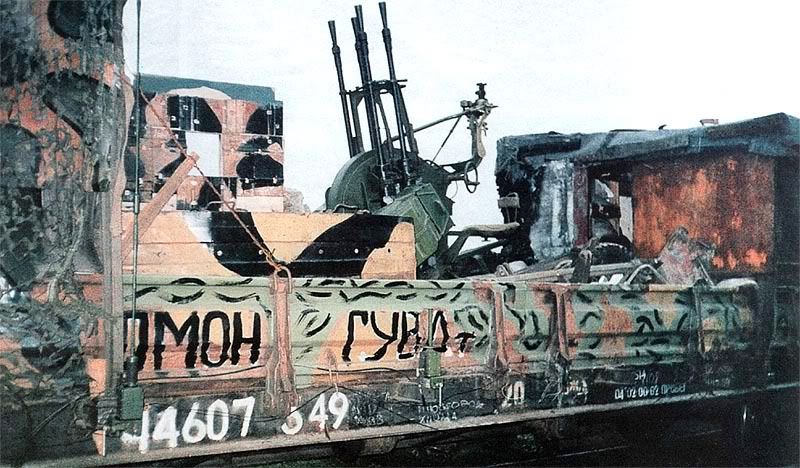 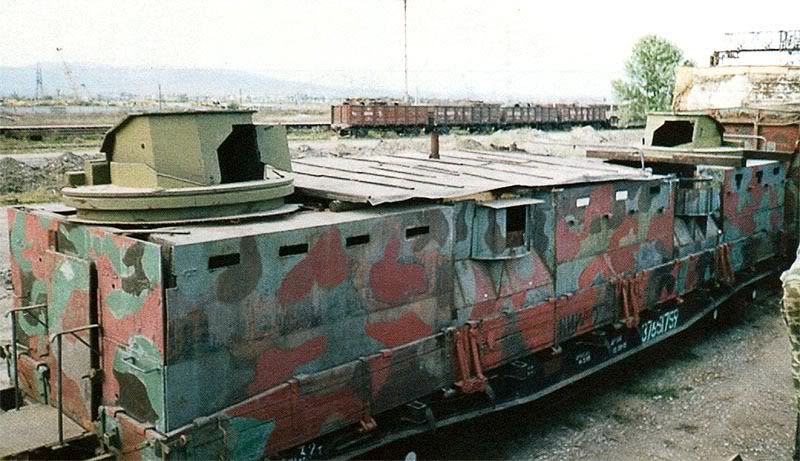 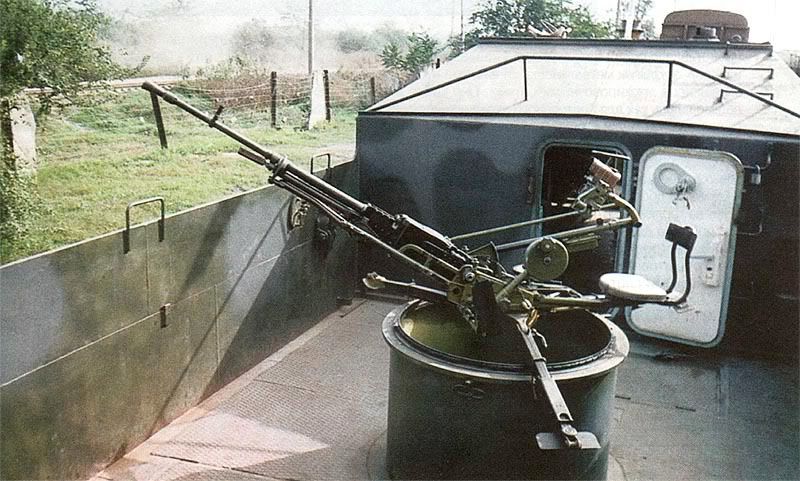 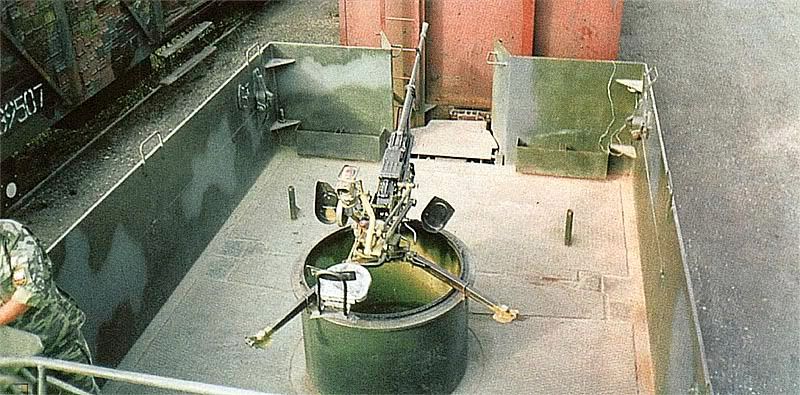 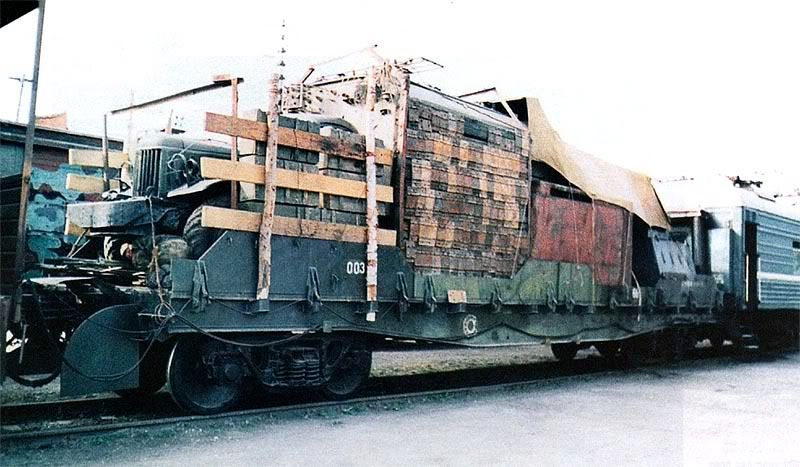 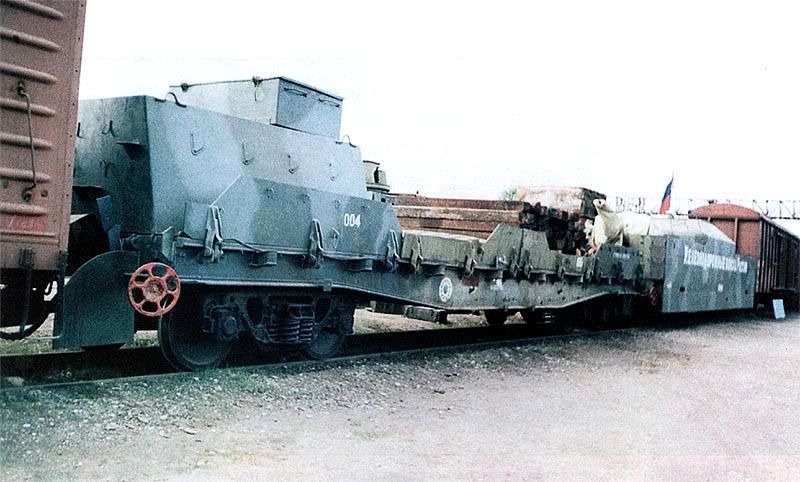 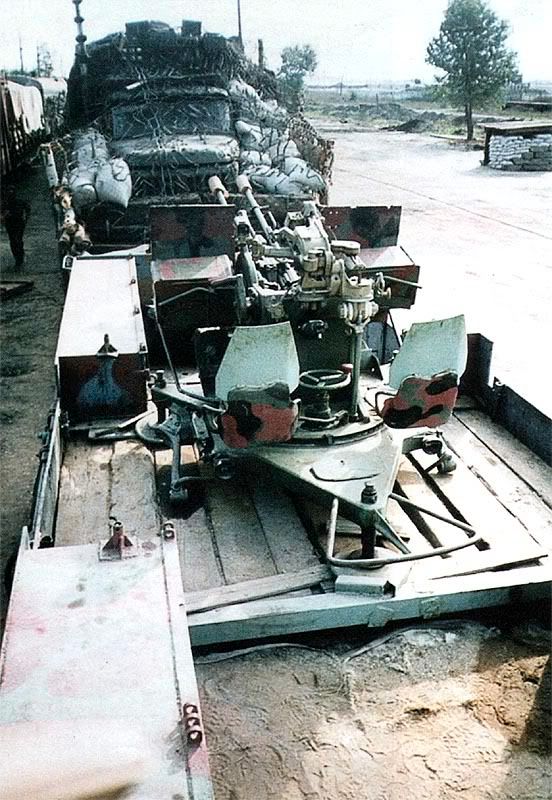 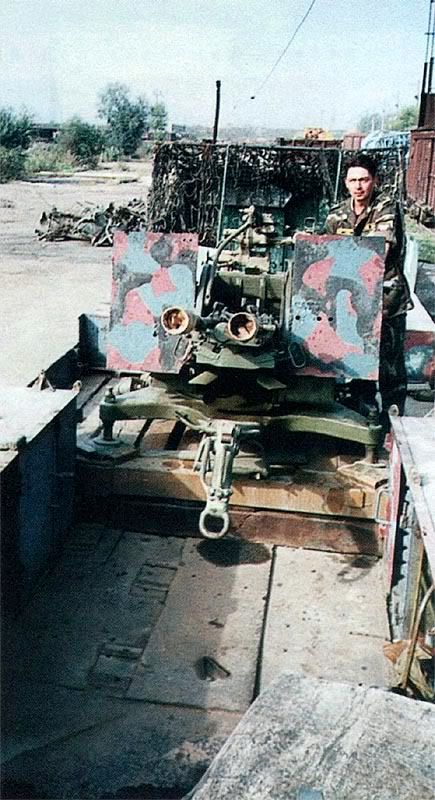 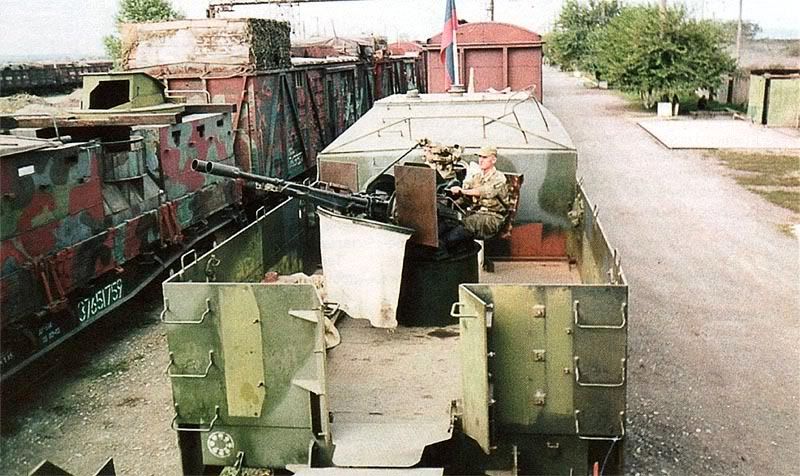
__________________
I love the smell of napalm in the morning. You know, one time we had a hill bombed, for 12 hours. When it was all over, I walked up. We didn't find one of 'em, not one stinkin' body. The smell, you know that gasoline smell, the whole hill. Smelled like... victory. Someday this war's gonna end... |
|
#7
|
||||
|
||||
|
Thanks Chico. Very nice. Interesting how these armored trains have not change that much in over a century.
I guess, I'll have to reduce the sophistication of these in my game. Do you know the general use of all these wagons? I guess that the Zil-157 was used as a command post and would love to know what was arming the turrets of the fully armored wagon. |
|
#8
|
||||
|
||||
|
A true Twilight dream.

|
|
#9
|
||||
|
||||
|
The first source Ihad identified it as an Indonesian armored train. In fact, it was a russian armored train, possibly from the chinese-soviet war, that was discussed on an Indonesian forum. Anyone speaking indonesian?
|
|
#10
|
||||
|
||||
|
two from Russia, a panzer train in Poland, an freshly painted armored train from Slovenia nad a relic for the Czech.
|
|
#11
|
||||
|
||||
|
Quote:
I might still have some other Soviet ones (in addition to the ones Mo' already posted), the curse of 17,000 images in my archive...
__________________
I love the smell of napalm in the morning. You know, one time we had a hill bombed, for 12 hours. When it was all over, I walked up. We didn't find one of 'em, not one stinkin' body. The smell, you know that gasoline smell, the whole hill. Smelled like... victory. Someday this war's gonna end... |
|
#12
|
||||
|
||||
|
Scranton has "Steamtown, USA", a collection of restored steam locomotives. Scranton also has an artillery shell production factory (right downtown, IIRC). Also nearby is the Tobyhanna Army Depot, and lots and lots of coal mines (hearly all defunct, however).
Strasburg, PA, near Lancaster, has 8 _operational_ steam locomotives currently and about a dozen more stored (meaning non-operational) The East Broadtop Railway is operating 2 steam locomotives out of Orbisonia (central PA west of the Blue Ridge. Heck, I just discovered that Dillsburg (15 miles south of Harrisburg on the way to Gettysburg) has been host to the Williams Grove Steam RailRoad (one operational steam and 2 diesels) for over 50 years! They've also been hosting a steam meet a couple of times a year--steam tractors and other goodies like "donkey engines" to provide portable power to sawmills and other industries. These steam enthusiasts will become rare treasures come the apocalypse. Another meeting place for steam enthusiasts has been the Lawrence County Steam Fair in Portersville, PA.
__________________
"Let's roll." Todd Beamer, aboard United Flight 93 over western Pennsylvania, September 11, 2001. |
|
#13
|
||||
|
||||
|
|
|
#14
|
||||
|
||||
|
http://www.tvrail.com/pages/our-collection-of-equipment
Tennessee Valley Railway has operated several engines, 3 of them steam-fired, for many years, including the period covered by the Twilight War.
__________________
"Let's roll." Todd Beamer, aboard United Flight 93 over western Pennsylvania, September 11, 2001. |
|
#15
|
|||
|
|||
|
Quote:
Unfortunately, most of what seems to be operable at Steamtown are switchers. That does make sense, since they're useful for moving other locos and cars around as working engines, but it means the collection's less useful for freight or troop haulage, since the long-haul trains are mostly cosmetic restorations or awaiting restoration. On the flip side, it does have a working roundhouse that can do the restoration work, which would be an incredibly valuable resource. For TNE, I was working on a locomotive design sequence at COTI. It's not nearly complete, but it might make for a useful set of notes for anyone working on their own locomotives for T2K.
__________________
The poster formerly known as The Dark The Vespers War - Ninety years before the Twilight War, there was the Vespers War. |
|
#16
|
||||
|
||||
|
Armored Trains are no longer a thing of the past.
https://www.thedrive.com/the-war-zon...ion-of-ukraine -
__________________
Author of Twilight 2000 adventure modules, Rook's Gambit and The Poisoned Chalice, the campaign sourcebook, Korean Peninsula, the gear-book, Baltic Boats, and the co-author of Tara Romaneasca, a campaign sourcebook for Romania, all available for purchase on DriveThruRPG: https://www.drivethrurpg.com/product...--Rooks-Gambit https://www.drivethrurpg.com/product...ula-Sourcebook https://www.drivethrurpg.com/product...nia-Sourcebook https://www.drivethrurpg.com/product...liate_id=61048 https://preview.drivethrurpg.com/en/...-waters-module |
|
#17
|
||||
|
||||
|
The start of this thread is about Rail traffic.
During the self-imposed oil shortage (my belief) of the early ’70s some serious research was given to reintroducing steam power using coal fuels. Both the Southern Pacific and the (then) Denver and Rio Grande had serious need of heavy hauling power due to the mountain grades. Both also had a very few old steam engines available, the engines had mostly been converted to oil burners but the change back to coal did not present a problem either mechanically or financially. The best fuel source, using coal) had been injected coal slurry. Once a hot enough fire had been achieved in the firebox by solid coal then a mix of powdered coal and water was injected over the fire. My understanding is that the project had not met any obstacles that would have derailed it (pun intended) until the fact that sufficient mechanics to maintain the equipment were going to have to be trained and there were no longer any engineers to run the things. In our game however petro fuels and the ability to resume production of them in sufficient quantities is trump. Another way to get bulk and quantity transport of goods is steam power. Starting with the rail fan stuff and the railroad museum restorable engines and some bright boys with machine shops, well a game idea or at least a thought. I have lived in both California and have seen the Sacramento Rail museum and the SP engines that still run for excursion as well as Colorado and the many restored and operable engines here. I presume that the east and south have much the same or even more. Have fun telling me your thoughts
__________________
Tis better to do than to do not. Tis better to act than react. Tis better to have a battery of 105's than not. Tis better to see them afor they see you. |
|
#18
|
|||
|
|||
|
As a railfan, I applaud any such topic. I think we've dealt with this before? EDIT: now I see the early thread on this very page!
Something to keep in mind is that steam power requires a lot of maintenance-- locomotives incur significant downtime between runs. You will need a skilled staff of "rounders" (roundhouse/engeinhouse workers) at each end of the line. Clean water, coal (wood), and a clear track are also important. Clean sand, if the line is hilly. Bulk cargoes are rail's most efficient, so a coal mine is probably the first thing that would want to open a line, in T2k's setting, a track to a city's power station is probably the first thing to open.
__________________
My Twilight claim to fame: I ran "Allegheny Uprising" at Allegheny College, spring of 1988. |
|
#19
|
||||
|
||||
|
Woot!!! Thanks for doing my research! Great info and thank you one more time.
__________________
Tis better to do than to do not. Tis better to act than react. Tis better to have a battery of 105's than not. Tis better to see them afor they see you. |
|
#20
|
||||
|
||||
|
Something else to consider is that steam engines can run on liquid biofuels (e.g. ethanol) with far fewer problems than internal combustion engines running on the same fuel.
Now this won't help you much when you're trying to keep your truck or MICV running but for something like a large boat, stationary engines, bulldozers, farm tractors and the like, installing a steam engine and running it on ethanol may be a viable solution for the long term. The principles for this have been known and in use for some time with such things as miniature & model steam engines that burn white spirit/turpentine, kerosene and such like to heat their boilers. There are also steam locomotives that use liquid fuels but they typically used heavy oils to fire the boiler, as I understand it (and my understanding is pretty limited), these steam locos could run on ethanol but it would require a complete remodelling of the combustion chamber. In the original design, the oil fuel was atomized and the resultant mist was then ignited to heat the boiler. Conversion to a liquid fuel like ethanol would require the oil pan be replaced with burners or such like. As mentioned, I actually know very little about this in regards to steam locos so any of the steam enthusiast here, please feel free to jump in and fix up anything I got wrong! |
|
#21
|
||||
|
||||
|
Looks like an M18 Hellcat turret on this one (from the Yugoslav Wars). Edit: Actually, it looks like the whole Hellcat (or hull too, at least).
__________________
Author of Twilight 2000 adventure modules, Rook's Gambit and The Poisoned Chalice, the campaign sourcebook, Korean Peninsula, the gear-book, Baltic Boats, and the co-author of Tara Romaneasca, a campaign sourcebook for Romania, all available for purchase on DriveThruRPG: https://www.drivethrurpg.com/product...--Rooks-Gambit https://www.drivethrurpg.com/product...ula-Sourcebook https://www.drivethrurpg.com/product...nia-Sourcebook https://www.drivethrurpg.com/product...liate_id=61048 https://preview.drivethrurpg.com/en/...-waters-module Last edited by Raellus; 07-08-2015 at 02:19 PM. |
 |
| Tags |
| trains |
| Currently Active Users Viewing This Thread: 1 (0 members and 1 guests) | |
|
|
 Similar Threads
Similar Threads
|
||||
| Thread | Thread Starter | Forum | Replies | Last Post |
| Twilight Today or Twilight 2009 if you will... | General Pain | Twilight 2000 Forum | 17 | 06-27-2009 03:22 PM |